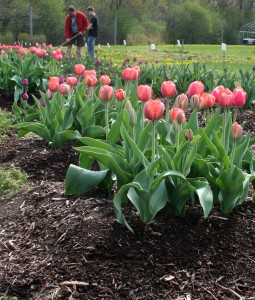
Dig no more: Just till 2 inches for tulip bulbs, study finds [Cornell Chronicle, October 12, 2011] features Bill Miller‘s study showing that a much easier method of planting tulip bulbs is just as effective as digging the traditional 6 to 8 inch holes for each bulb.
Extension trains Roosevelt Island maintenance staff in landscape horticulture [Cornell Chronicle, October 10, 2011] – Cornell University Cooperative Extension-NYC (CUCE-NYC) Urban Environment Program recently completed second year of professional development sessions including classroom and lab instruction on such topics as introduction to botany, plant and weed identification, soil and plant nutrition, and planting and maintenance of trees and shrubs.
Two recent articles feature former Cornellians: Fruit Wines Move Into a Sophisticated Realm [New York Times, October 8, 2011] features Jamie Jones, the sixth-generation owner of Jones Family Farm in Shelton, Conn., who added grapes to the family’s 400-acre farm fruit farm in 1999 to provide more wine-making options. Mums for Everyone profiles the Gerard Family — three generations of Cornell alumni — who run The Mum Farm in New Hartford, N.Y.
‘Club varieties’ of apples — where germplasm is restricted to certain growers and marketing and quality control are carefully managed — has received a lot of ink lately as possibly a new model for produce. Susan Brown, associate chair, is cited in The Lexus of Fruit [The Daily, October 1, 2011]: “Another model for apple regulation is being explored in Washington and New York. Washington State University and Cornell have both released new apple varieties exclusively to growers in that state. Susan Brown, who helped develop New York varieties as professor of horticulture at Cornell, said the biggest advantage to this approach will be more upfront money for marketing and, hopefully, an economic boost for the state.” There’s an extensive interview on the subject with the Dyson School’s Brad Rickard at the Perishable Pundit.


